https://esgbusiness.com/

EXCEPTIONAL BUSINESSES LAUDED AT THE INAUGURAL ESGBUSINESS AWARDS


PLN LEADS ASEAN IN ENERGY SECTOR SUSTAINABILITY GOVERNANCE
REGULATORY DELAYS DAMPEN INDONESIA’S CARBON CREDIT MARKET MOMENTUM
WHAT SUSTAINABILITY TRENDS WILL DEFINE THE SOUTH KOREAN GROCERY?
LOW CLIMATE LITERACY SIGNALS COMMUNICATION FLAW
Issue No. 01 ESGBusiness
Display to 28 February 2025


SINGAPORE
Charlton Media Group 101 Cecil St. #17-09 Tong Eng Building Singapore 069533 +65 3158 1386
HONG KONG
Charlton Media Group Hong Kong Ltd Room 1006, 10th Floor, 299QRC, 287-299 Queen’s Road Central, Sheung Wan, Hong Kong www.charltonmedia.com
MIDDLE EAST
FDRK4467, Compass Building, Al Shohada Road, Al Hamra Industrial Zone-FZ Ras Al-Khaimah, United Arab Emirates Can
Editorial Enquiries: If you have a story idea or press release, please email our news editor at editor@esgbusiness.com. To send a personal message to the editor, include the word “Tim” in the subject line.
Media Partnerships: Please email abf@charltonmedia.com with “partnership” in the subject line.
FROM THE EDITOR

With societal pressures of trying to prove green credentials, banks face questions on their sustainability initiatives and investments. Read more on page 6. South Korean shoppers are also willing to spend more on sustainable products and packaging, pushing grocers to invest more in green trends. Go to page 17 to know more.
The focus turns to the consumers, who display an alarmingly low level of climate literacy in contrast with the growing concern for the effects of climate change. Go to page 10 to know more about the study.
We chat with Temasek Foundation CEO Lim Hock Chuan about funding struggling innovations and startups. Read his insights on page 12. We also talk with PT PLN President Director Darmawan Prasodjo about achieving the lowest ESG risk rating in the ASEAN electricity sector for 2023. Turn to page 14 to know more.
Exceptional businesses have been lauded at the inaugural ESGBusiness Awards. These companies have put ESG at the forefront of their initiatives and have met the growing societal and investor demand for ethical and sustainable practices. Check out the list of award recipients on page 20. Congratulations!
To a better and healthier world.

ESGBusiness is a proud media partner and host of the following events and expos:

ESGBUSINESS 2024 1
Tim Charlton
we help?
is
by Charlton Media Group. All
is copyright and may not be reproduced without consent. Contributions are invited but copies of all work should be kept as ESGBusiness can
no
loss.
will however take the gains. *If you’re reading the small print you may be missing the big picture MICA (P) 249/07/2011 No. 67 PUBLISHER & EDITOR-IN-CHIEF Tim Charlton EDITORIAL MANAGER Tessa Distor PRINT PRODUCTION EDITOR Eleennae Ayson PRODUCTION TEAM Frances Gagua Lady Jo-An Llorin Consuelo Marquez Aulia Pandamsari Ibnu Prabowo Jaleen Ramos Joanne Christine Ramos EDITORIAL RESEARCHER Angelica Rodulfo GRAPHIC ARTISTS Simon Engracial COMMERCIAL TEAM Janine Ballesteros Jenelle Samantila Cristina Mae Posadas ADVERTISING CONTACTS Shairah Lambat shairah@charltonmediamail.com AWARDS Julie Anne Nuñez awards@charltonmediamail.com
Subscriptions: Please email subscriptions@charltonmedia.com. ESGBusiness
published
editorial
accept
responsibility for
We


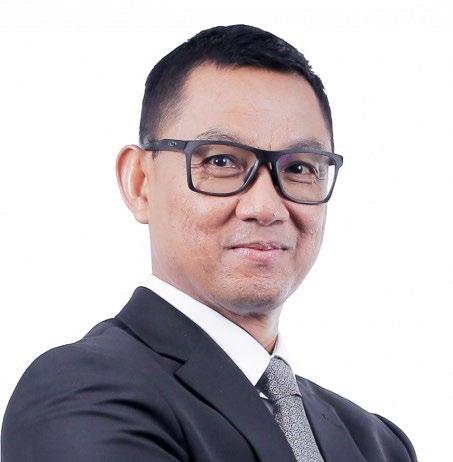
2 ESGBUSINESS 2024 2 ASIAN BANKING AND FINANCE | MARCH 2019 Published annually by Charlton Media Group Pte Ltd 101 Cecil St. #17-09 Tong Eng Building Singapore 069533 For the latest news on sustainability, visit the website www.esgbusiness.com CONTENTS CONTENTS 22 EVENT COVERAGE EXCEPTIONAL BUSINESSES LAUDED AT THE INAUGURAL ESGBUSINESS AWARDS CEO INTERVIEW PLN LEADS ASEAN IN ENERGY SECTOR SUSTAINABILITY GOVERNANCE 14 12 INTERVIEW TEMASEK FOUNDATION HELPS FUND STRUGGLING SUSTAINABILITY INNOVATIONS AND STARTUPS FIRST INTERVIEW COUNTRY REPORT 06 Greenwashing in banking: real concern or overblown issue? 07 SMEs prioritise on-site work over concerns on health and well-being 08 Coal reliance shadows Asia’s eco aims 16 Regulatory delays dampen Indonesia’s carbon credit market momentum 17 What sustainability trends will define the grocery market in South Korea? 10 Low climate literacy signals communication flaw 18 How can sustainability practices pave the way to profitability?





Empowering a sustainable future together


ESGBUSINESS 2024 3 Discover more today www.ntuclearninghub.com
News from esgbusiness.com
Daily news from Asia

REGULATION
HK’s funds industry needs to assess climate-related risks
The Securities and Futures Commission will be implementing new disclosure requirements which will be applicable to fund managers with at least HK$8b in assets under management. The categorisation of investment funds will depend on a number of factors, such as investment strategy.

FINANCE
How the financial services industry can have a good ESG data programme
Implementing ESG policies is one of the ways for businesses to attain a sustainable economy, but its impact is measured as a tick-box without a “defined purpose and strategy,” instead of “a corporate purpose in line with social and environmental prosperity”, according to Baringa.

MARKETING
Over 60% worry brands’ sustainability drive is for commercial
Kantar found that many companies are being accused of greenwashing, which presses the need for brands to find a way to avoid inauthenticity charges. This has become urgent with consumers becoming more concerned about brands and their social and environmental initiatives.

MANUFACTURING
Green procurement policies needed on path to net-zero
Governments will need to put a green procurement framework in place to accelerate its efforts to achieve net-zero, a report noted. The BCG and WEF found that cement manufacturing alone accounted for 7% of the world’s carbon emissions.

MANUFACTURING
Manufacturing firms should address gap in implementing sustainability
Whilst manufacturing firms have goals in place to address sustainability needs in their operation, Kearney found that there is a “huge gap” in turning their strategies into practice. Around 56% were dissatisfied or moderately satisfied with their sustainability progress, according to the report.

REGULATION
APAC struggles with sustainable practices in ESG areas
APAC region lags significantly behind global standards when it comes to implementing sustainable practices across key environmental, social, and governance pillars, according to a report by KPMG and Quinlan & Associates. APAC also ranks highest in terms of natural hazard risk.


Belden: Empowering transformation through connectivity and innovation
With a legacy of innovation and a commitment to driving positive change, Belden pioneers transformative connectivity solutions for a sustainable and connected future.

In today’s hyper-connected world, the importance of reliable and efficient connectivity cannot be overstated. At the forefront of this digital revolution stands Belden, a global leader in providing innovative connectivity solutions that empower industries, businesses, and communities worldwide. Belden has continually evolved to meet the everchanging needs of its customers whilst driving positive change in the industry.
Belden: A legacy of innovation
Established over a century ago, Belden has a rich history rooted in innovation and a relentless pursuit of excellence. Originally founded as a wire and cable manufacturing company, Belden established itself as a trusted provider of high-quality products, setting the stage for its remarkable evolution into a global connectivity solutions powerhouse.
Driven by a commitment to innovation and customer satisfaction, Belden has continually pushed the boundaries of what’s possible in the world of connectivity. From developing cuttingedge networking technologies to pioneering advanced automation and smart infrastructure solutions, Belden has remained at the forefront of technological innovation, empowering businesses to thrive in an increasingly digital world.
Belden’s transformation: From productcentric to solution-centric
As the demands of the market evolved and technology became more integrated into every aspect of business operations, Belden recognised the need to adapt its approach. This led to a strategic transformation from a product-centric organisation to a solution-centric one, aimed at providing comprehensive, endto-end solutions that address the complex challenges faced by modern businesses.
This transformation has not only enabled Belden to better meet the needs of its customers but has also positioned the company as a trusted partner in driving digital transformation and innovation across industries. By combining cuttingedge technology alongside their industryleading expertise, Belden is helping businesses unlock new opportunities, optimise their operations, and achieve their goals more efficiently.
Recognising the importance of responsible business practices, Belden has implemented a wide range of initiatives aimed at reducing energy consumption, minimising waste, and promoting ecofriendly manufacturing processes, products, and solutions.
Belden
Through these efforts, Belden aims to create value for its customers, shareholders, and communities whilst ensuring business success and a brighter future for all.
ESG Business Awards in Singapore: Recognising excellence
Belden’s commitment to sustainability and corporate responsibility has not gone unnoticed. The company is proud to have been recognised with prestigious ESG (Environmental, Social, and Governance) business awards in Singapore, which highlight its outstanding contributions to sustainability and efforts to integrate ESG principles into its business strategy.
These awards serve as a testament to Belden’s ongoing commitment to driving positive change within the industry and its dedication to making a meaningful impact on society. By prioritising ESG initiatives, Belden is not only strengthening its own business but also setting new standards for excellence within the industry.
In conclusion, Belden’s journey from a wire and cable manufacturer to a global supplier of network infrastructure and digitization solutions is a testament to its ability to adapt, innovate, and lead in a rapidly evolving market.
Through its commitment to innovation, and excellence, Belden is proud to connect the world today whilst building a more sustainable and connected future.

ESGBUSINESS 2024 5
is helping businesses unlock new opportunities, optimise their operations, and achieve their goals
RENEWABLE ENERGY ADOPTION AWARD - CHINA WASTE REDUCTION AWARD - INDIA
Belden Hirschmann Industries (Suzhou) Limited and Belden India Private Limited at the ESGBusiness Awards
Mr Pavan Mahajan, Managing Director, Solution Delivery, APAC

Greenwashing in banking: real concern or overblown issue?
Faced with pressures of trying to prove their green credentials, banks now field questions on the veracity of their sustainability initiatives and claims of “greenwashing”, experts observed.
“I think it's quite difficult to assess how prevalent greenwashing is. Firstly, I don't think anybody really does a reliable analysis of how prevalent greenwashing is. It’s detected anecdotally by incidents,” Eugene Goyne, EY Asia-Pacific financial services regulatory lead, told ESGBusiness in an interview.
“What I would say is, there's a massive increase in the volume of sustainability disclosures coming from different perspectives,” Goyne said.
With the increasing amount of sustainability-linked financial products and disclosures coming out, it’s expected that there will be a level of mistakenly inaccurate or misleading statements, and even an element of deliberate misrepresentation or fraud. But this isn’t limited to just greenwashing, Goyne said–it’s a common occurrence when disclosures
and regulations are involved. “Sustainable finance is no different in that respect to other forms of financial disclosures or product disclosures,” Goyne noted. “There'll be a level of mistake and there'll be a level of fraud. You see that in listed company disclosures and bank disclosures and asset manager disclosures. But sustainable finance isn’t any more vulnerable to that.”
Goyne recognized, however, that reputational risks abound for those who drag their feet about sustainability or engage in greenwashing practices.
“Trust and disclosures to the financial system are absolutely critical for the system to help society transition to a more sustainable future. And greenwashing will undermine that trust when it occurs, if it's prominent enough, or widespread enough. It's hard to say how
much it's affected the trust in a brand, but it will be damaging when it occurs,” Goyne said.
More promises, less action
Where exact data on greenwashing could not be found, companies’ performances can be studied. A research by the Hong Kong Monetary Authority (HKMA) released in 2022, for example, found that about one-third of corporate green bond issuers were found to have poorer environmental performance after their initial green bond issuance.
Whilst this might not directly reflect the status of greenwashing in 2023, this indicates a level of greenwashing prevalence in the market, especially when there are not yet any fines introduced by the regulators in APAC, says Alan Au, APAC ESG Lead at Capco.
There is no similar study conducted for banks, but there were studies that bank investments to sustainability have stagnated in one of the major markets of interest when thinking about greenification: energy. A study by Sierra Club, Fair Finance International, BankTrack, and Rainforest Action Network found that just 7% of the total financing value extended by banks to companies for energy projects were funnelled to renewable energy.
“We did see that over the period [20162022], there is an increase in the value of financing that's going to renewable energy. But at the same time, there's also an increase in the value of financing that's going to companies engaged in fossil fuels,” Ward Warmerdam, Senior Financial Researcher for Profundo, said.
The lack of structure
A major challenge to accurately measuring and reporting sustainability efforts of financial institutions (FIs) is the lack of high-quality and reliable ESG data to enable clear net-zero commitments and adequate implementation plans to align with the local decarbonisation aims, Au noted to ESGBusiness.
The lack of regulatory enforcement on established ESG guidelines is another challenge. This is compounded by the fact that there seems to be no consensus amongst regional and global regulators on how sustainability should be reported or measured.
“Let's take the example of the EU regulation, what’s called the SFDR, or the sustainable finance disclosure regulation. It requires fund managers to label funds as to what type of ESG goals they have,” Goyne said. “The labels are regarded by the industry are very confusing.”
There'll be a level of mistake and there'll be a level of fraud, but sustainable finance isn’t any more vulnerable to that
6 ESGBUSINESS 2024 FIRST
Alan Au, Capco ESG lead, and Eugene Goyne, EY financial services regulatory lead
FINANCE

SMEs prioritise on-site work over concerns on health and well-being
Employee wellbeing is increasingly taking a backseat in Hong Kong's small- to medium-sized enterprises (SMEs), with a recent study by QBE revealing that as a growing number of employers promote on-site work, the focus on the health and wellness of their staff diminishes.
Results of the annual survey showed only 43% of SMEs in Hong Kong identified employee health,
safety, and wellbeing as the most relevant environmental, social, and governance (ESG) issue to their business last year, dropping from 49% in 2021 and 50% in 2020. This was shown in decreasing wellness support given to the employees.
According to the study, fewer employers are providing flexible working hours (31% vs 37% in 2023); care packages (27% vs 28% in 2021); and health and wellness
Having a comprehensive Employee Compensation Insurance (ECI) plan can help businesses protect themselves
benefits (26% vs 37% in 2021).
“It is regrettable to see employee wellbeing becoming less important to Hong Kong SMEs. Whilst there are multiple challenges and risks employers need to manage every day, let us not forget that employees are a company’s most valuable asset and resource,” said Lei Yu, chief executive officer for North Asia and regional head of distribution at QBE Asia.
“Taking action to support our workforce’s physical and mental wellness through various initiatives and benefits is key to the smooth running of other business activities,” Yu added. A little over half of SME employers were aware of the Employee Compensation Insurance (ECI) coverage – a legal requisite for all employers to ensure their businesses are protected in case of an unforeseen incident and provide affected staff with medical care. This is down from 67% in 2021.
Increased on-site work

How much does hybrid working cut carbon emissions? ENVIRONMENT
Hybrid working can reduce carbon emissions by up to 70% in the United Kingdom and 87% in the United States, a report found.
The report, conducted by IWG and Arup, linked this to the “dramatic” reduction in commuting.
Businesses are increasingly looking for buildings with green leases to reduce carbon emissions and enhance their environmental performance.
In 2024, companies will likely go after leases that offer more than energy efficiency, water conservation, waste reduction, and indoor air quality.
Attracting talent
“The migration to hybrid is one of the most important forces at play in the world today as workers increasingly embrace the opportunity to work locally,
bringing significant opportunities to the economies of local communities as well as creating a better work-life balance for employees,” Mark Dixon, Founder and CEO of IWG, said in the report.
“Hybrid working is radically reshaping how we work. Businesses that embrace it will attract the best talent and get the most out of their workforces all while reducing their bottom line. This pace of change will continue in 2024, with an increasing number of employees and businesses understanding the clear financial, cultural, and sustainability benefits that flexible working models can bring,” he added.
IWG noted that ongoing research at Stanford University and other institutes projected that a third or more of whitecollar workers will be under a hybrid setup in the long term.
For this year, 63% of SMEs are expecting employees to work-fromhome or hybrid setups to continue. Employers are split on office returns’ effects. The study found 40% of SMEs think remote or hybrid work harms employee mental health, yet a least a third see these models as beneficial.
Health and wellness benefits of hybrid working
Hybrid is good for our health 38%7 1 54%
Source: The Hybrid Migration, IWG and Arup
ESGBUSINESS 2024 7 FIRST
more exercise
have lost at least 5kg hours more sleep in a year
say they are more productive eat more nutritious meals
spend more time with family and friends
65%
79%
55%
HEALTHCARE
A new study showed employers are expecting less WFH setups
(Photo by Chris Montgomery from Unsplash)
Lei Yu
VC FUNDING FOR DECARBONISATION CRASHED BY 90%

Venture capitalists have become more cautious with their investments, particularly viewing decarbonisation projects as less immediately profitable. This cautious approach is highlighted by the GlobalData report, which reveals a 90% drop in VC funding for decarbonization projects in 2023, following a peak in 2022.
POWER INVESTMENT
In its Net Zero by 2050 report, GlobalData noted that decarbonisationrelated deals value fell to $45b in 2023 from a high of $433b in 2022. The report linked this to economic woes, high energy prices, lacking policy support and nascent technologies.
Current investments
Across renewable energy projects, the highest investment is allocated in wind, solar, and hydroelectric projects that require large amounts of capital.
Moreover, VC funding remains concentrated in traditional markets, such as the US which accounted for 51.36% of the total investment between 2019 and 2023. China placed second at 14.3%.
“In many ways this is unsurprising. VCs tend to focus on industries with extreme growth potential given that they are entering into businesses at such an early stage,” the report read.
“While renewable power has been shown to be a reliable investment with much higher returns than fossil fuels, the market is more mature than that of EVs. This focus may shift with EV sales growth having stalled.”

Coal reliance shadows
Asia’s eco aims
Asia’s pursuit of higher power consumption contradicts decarbonisation goals as it fosters dependence on fossil fuels. This becomes an even steeper climb as Asian markets run the risk of incurring financial losses with moves to retire high-emitting power plants ahead of their lifespan.
The region is projected to see the highest growth in power consumption in the next decade, Ashis Kumar Pradhan, senior coal analyst at Rystad Energy, told ESGBusiness. He noted that to meet this demand, the region is expected to depend largely on coal for electricity generation.
“To achieve their carbon neutrality goals by 2050-2070, many Asian nations plan to rely on fossil fuels in the short term. However, the long-term focus is shifting towards increasing the use of renewable energy sources with the support of battery storage and pumped hydro systems,” Pradhan added.
Asian nations have taken concrete steps to get rid of dirty energy with renewable energy targets coupled with coal phase-out and divestment
plans; but coal’s dominance remains. This is mainly linked to its affordability and reliability as a baseload power to support renewable energy (RE) sources.
Pradhan noted the region continued relying on coal during the pandemic with coal prices notably declining, compared to volatile gas prices.
“The current energy system is heavily optimised for the use of fossil fuel. Decarbonising the energy system will require countries to accept losses in these stranded fossil infrastructures before their planned retirement,” Dr. Ken Tay, senior regional energy transition analyst at Rystad Energy, said.
Coal in Asia
It did not help that Russia’s invasion of Ukraine drove prices of liquefied natural gas (LNG) to new heights, leading Asian markets to view gas as an “expensive and unreliable fuel source,” Warda Ajaz, project manager for Asia Gas Tracker at Global Energy Monitor, said. Pakistan, for instance, announced it will increase domestic power capacity, including coal, as it plans to phase out imported LNG.



China and India are amongst the economies actively promoting power generation, Pradhan noted. Rystad Energy data showed that in 2022, a total of 106 gigawatts (GW) of coalfired were approved by the Chinese government. Of this, around 50 GW were already under construction in 2022, whilst 56 GW are set to begin construction in 2023.
Likewise, India has introduced its National Electricity Policy which provides a target of 50 GW coal-fired power generation in the next decade. Rystad noted 25 GW of this was already in construction with plans to add the remaining 25 GW in the pipeline.
Meanwhile, Japan and South Korea have neither set plans to actively phase-out coal or construct new plants in the near-term; whereas Indonesia and Vietnam, which account for 65% of the coal-fired capacity in the region combined, have entered in the Just Energy Transition Partnership (JETP) to take a step out of coal.
Rystad Energy noted that as of 2022, Indonesia’s coal fleet reached 40 GW. With the JETP, the country committed to suspend nearly 14 GW of on-grid coal-fired power and decommission existing plants before its planned lifecycle ends.
8 ESGBUSINESS 2024 FIRST
Coal is still used as an affordable and reliable baseload power for RE sources
Ashis Kumar Pradhan
Warda Ajaz
Ken Tay

https://vinschool.edu.vn/en/home-page/
First and Only Education System in Vietnam Accredited by the Council of International Schools (CIS)
VINSCHOOL
LEARNING BEYOND LIMITS



Since 2013 Campuses



50 Students Over 48.000



Widest Range of Cambridge Subject Choices in Vietnam: 9 IGCSE subjects and 12 AS/A-Level subjects
Record of Academic Excellence: 51.54% IGCSE A*/A scores, 33.9% A Level A*/A scores, 8 Cambridge highest academic achievements in Vietnam
Personalized Learning Pathways: 1-1 counseling, “Mini University” model offering 50-subject selection
Leaders in Digital Transformation & Sustainable Development with 2023 Asian Technology Excellence Awards & 2023 ESG Business Awards Developing Talents to Serve the Community with GATE Center
43.6% students studying abroad achieve 30% –100% scholarships at prestigious universities globally (2023)
ESGBUSINESS 2024 9 VINSCHOOL: YOUR GATEWAY TO WORLD-CLASS EDUCATION AND OPPORTUNITIES
51.54% 43.6%
Low climate literacy signals comms flaw
Only 8% of respondents have demonstrated a high level of climate knowledge.
Despite growing recognition and concern surrounding the implications of climate change, the public exhibits an alarmingly low level of climate literacy, according to a report by Allianz SE.
The Allianz Climate Literacy Survey 2023 revealed that there is a high level of climate anxiety compared to climate literacy. Although the percentage of respondents with low climate literacy declines proportionally with increasing levels of climate anxiety, only less than one-third of skeptics have a basic understanding of climate change, whilst just under half of those alarmed by climate change lack knowledge.
Emotionality was also identified as an overlooked factor in spreading fear, especially when combined with low climate literacy, and has been used to advance populist agendas.
Despite overall trust in experts, only 41% of those with low climate literacy believe scientists should provide advice, compared to 54% with average literacy and 73% with high literacy, as per the survey.
“Well, it has a lot to do with the way we’ve been communicating about climate, climate action, and climate change,” Patricia Pelayo-Romero, senior economist for Insurance & ESG at Allianz SE and co-author of the report, told ESG Business Magazine.
Findings also revealed that an average of 76.8% of respondents across Germany, Brazil, China, France, India, Italy, the United Kingdom, and the United States expressed alarm on the consequences of global warming. However, despite this heightened concern, only 7.9% of respondents demonstrated a high level of climate knowledge.
The declining climate literacy is also mirrored in a growing nonchalance on the impact of climate change, as evidenced by diminished awareness of threats, such as damages associated with temperatures exceeding 1.5°C.
Pelayo-Romero pointed out the need to move beyond tapping into the emotional aspect alone and instead integrate expertise and science in a more approachable manner for the general population. She noted that there is a widespread concern and alarm, particularly among the younger population, yet a deficiency in their knowledge about climate science and general aspects of climate change. “There is a flaw in communication here,” she said.
Science-backed strategies
To address this communication gap, Pelayo-Romero suggested science-backed strategies that make climate change an engaging and non-alienating topic.
“We can frame it as a public health issue–which it is. We should tap into the co-creation of material with the public so they can be more engaged,” she advised.
According to the World Health Organisation, climate change, acting as a threat multiplier, has the potential to

reverse health progress. More frequent and intense weather events, such as storms and extreme heat, directly and indirectly increase health risks, including deaths, diseases, and emergencies.
Additionally, climate shocks and stresses like changing temperature patterns and rising sea levels degrade crucial environmental and social determinants of physical and mental health, affecting everything from air and water quality to food systems and livelihoods.
The organisation has warned that delaying action on climate change will exacerbate health risks, erode decades of global health improvements, and contradict collective commitments to ensure the universal human right to health for all.
The senior economist further emphasised the importance of social comparison and providing guidelines on best practices. Pelayo-Romero underlined the trust deficit in scientific expertise, highlighting the need to build trust and credibility in the scientific community.
“Fostering distrust in science is something that we should really look into,” she stressed.
Climate policies
Fostering distrust in science is something that we should really look into
On the impact of low climate literacy on public support and understanding of climate policies, Pelayo-Romero asserted that climate literacy should help individuals comprehend how policies influence the path towards achieving global climate targets.
Amidst the numerous climate policies that have proven ineffective in halting climate change, governments worldwide have made progress, successfully implementing various climate policies.
10 ESGBUSINESS 2024 INTERVIEW
GLOBAL
Patricia Pelayo-Romero, Senior Economist for Insurance & ESG at Allianz SE
76% of cloud users say controlling cloud costs is their #1 challenge
Book your complimentary cloud strategy session today!



Temasek Foundation helps fund struggling sustainability innovations and startups
Its criteria for selection in funding failing startups include desirability, feasibility, and viability of businesses.
With a failure rate as high as 30% amongst Singaporean startups, as highlighted by e27's research, the government-backed Temasek Foundation is stepping in, offering potential capital injections. But before a startup can acquire this capital, it must meet the foundation’s specific criteria. Lim Hock Chuan, head of programmes at Temasek Foundation, outlined these as desirability, feasibility, and viability.
Elaborating on 'desirability', Lim explained that they assess whether the business aims to address a particular issue."
As for feasibility, it is important that the business can indeed develop the solution. “Also, we look at whether there are regulatory issues that you need to address. What is the technology that’s out there from your competitors?”
Lim told ESGBusiness magazine.
The last criterion is the financial viability or affordability of a business solution or product, he said.
“For example, if you say that I can produce a plastic bag that can solve all the problems we have today, but each plastic bag costs SG$5 (US$3.67), then it’s not financially viable,” he explained. When asked which of the three criteria is the most difficult, Lim said some applicants have a difficult time explaining the technical feasibility and business viability of their innovation.
But that does not mean Temasek Foundation will not help these businesses. Another type of assistance is Temasek Foundation can find a testbed for the product of these startups and navigate the regulatory environment.
This way, businesses will be introduced to experts or other organisations that could partner with them or mentor them in improving their operations, Lim said.
After these three steps, the businesses will then be introduced to investors to create an operational prototype.
“We help small businesses in the innovation space, and bring the ideas and research from the lab into the community to produce goods and services that will benefit the community,” Lim shared with ESGBusiness.
Success stories
An example of a business that Temasek Foundation has helped is NEU Battery Materials, a startup that recycles old lithium batteries to produce battery-grade raw materials.
The company uses a patented scalable technology that employs electrochemical separation to recycle lithium batteries cleanly and sustainably.
According to Lim, the process has very minimal carbon emissions and waste. He added that the project addresses both energy and carbon footprint issues.
So far, since it began in 2016, Temasek Foundation has helped 55 businesses with sustainability innovations, providing them with a total of SG$44m (US$32.27m) in grants and attracting SG$424m (US$311.03m) in followon funding.This year’s edition of Temasek Foundation’s The Liveability Challenge (TLC), which was launched in 2018,
We help small businesses in the innovation space, and bring the ideas and research from the lab into the community
helps support start-ups that have ideas for decarbonisation to fulfill Singapore’s net zero targets in 2050. They contribute to this by launching the TLC every year, drawing 600 applications from 80 different countries. One of the applicants is the startup, Equatic, funded by Temasek Foundation, to help the business create a scalable process that removes carbon dioxide from the ocean. “This is an example of a kind of project that tackles the removal of carbon and when we do that, we’re well on our way to meet our net zero emission target for Singapore,” said Lim.
TLC’s sixth edition included ocean ecosystem solutions as a focus area for the first time and doubled the grant funding to SG$2m (US$1.4m) – a million-dollar prize each for two tracks such as climate change and food & nutrition.
Under climate change, the focus is on disruptive innovations that can decarbonise energy generations and industries, and capture and use carbon to create scalable products for global markets.
Under food and nutrition, those considered are disruptive innovations that can establish circular urban agriculture or aquaculture, or alternative protein systems.
The finalist programmes represent a wide range of solutions that have the potential to significantly address the devastating impacts of the climate crisis, from decarbonising the economy, to improve the food and nutrition systems that Asia so heavily depends on.

12 ESGBUSINESS 2024 INTERVIEW
SINGAPORE
Lim Hock Chuan, head of programmes at Temasek Foundation




PLN leads ASEAN in energy sector sustainability governance
The utilities provider reduced its greenhouse gas emissions by 9.7m tonnes
As the sole powerhouse in Southeast Asia’s electricity distribution, PT PLN (Persero) of Indonesia sets a benchmark in environmental and sustainability efforts by achieving the lowest ESG risk rating in the ASEAN electricity sector for 2023, down eight points from the previous year.
Reducing its risk rating from 38.5 in 2022 to 30.3 in 2023 is only the starting point of its successful and impressive initiatives, according to PLN President Director Darmawan Prasodjo.
In an exclusive interview with ESGBusiness, Prasodjo talks about the long road to achieving sector-wide ESG goals, and how PLN’s reduction is already an achievement that puts it ahead of the race in the region.
“We are grateful for PLN’s strong commitment to actualising ESG, resulting in a significant eight-point decrease in ESG risk rating from 2022,” said Prasodjo of the latest Sustainalytics report. “Of course, this achievement does not make us complacent; instead, it ignites the spirit of all PLN personnel to strive for continuous improvement.”
Apart from suiting up to conducting sustainable business, this push by state-owned PLN is also aligned with the Indonesian government’s efforts to achieve a just energy transition towards Net Zero Emissions (NZE) by 2060 and to realise sustainable development goals.
Prasodjo outlined several key contributors to PLN’s ESG risk reduction, including climate change risk governance, greenhouse gas (GHG) emissions reporting, water governance programmes, talent development, cyber security programmes (ISO 27001), and tax disclosure.
Decarbonisation success
PLN is definitely keeping tabs on its numbers to measure the success of its sustainability journey. For decarbonisation, PLN reduced Greenhouse Gas (GHG) emissions by 9.7 million tonnes of CO2e in 2023 compared to “business as usual.”
Also, PLN, through the Gas and Steam Power Plant (PLTGU) Muara Karang Block 3, began trading Emission Reduction Certificates (SPE) in October 2023 with a trading quota of 900,000 tonnes of CO2e (carbon dioxide equivalent) establishing it the largest trader in the carbon market.
Last year, PLN added 296 megaWatts (mW) of renewable energy-based power plants whilst utilising one million tonnes of biomass for coal-fired power plants, reflecting a reduction of 1.05 million tonnes of CO2e emissions.
On top of all that, PLN continued to develop the electric vehicle ecosystem by supplying electricity to 1,081 electric vehicle charging stations last year.
At present, PLN-operated charging stations have reached 624 units distributed across 427 locations.
ESG transparency
As a demonstration of transparency in ESG risk management, PLN has released the Task Force on
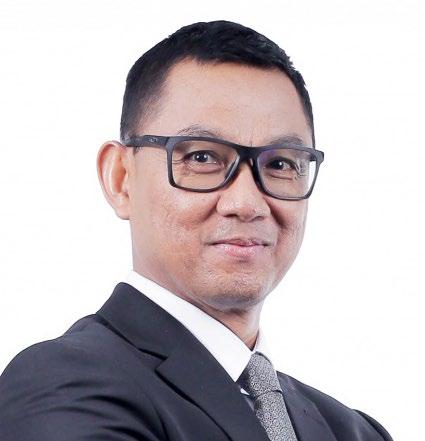
Darmawan Prasodjo, PLN President Director
Climate-related Financial Disclosure Report, the ESG Performance Report, and completed the Climate Change and Water Security questionnaire for the Climate Disclosure Project (CDP).
PLN has also implemented Risk Rating mechanisms for power plants and substations and released policies on crucial issues such as climate change, biodiversity, environmentally friendly procurement, social policies for suppliers and contractors, workplace respect policies, and others.
“We affirm that PLN is ready to fulfill its noble duty of providing a better living environment for future generations,” Prasodjo shared with ESGBusiness magazine.
We affirm that PLN is ready to fulfill its noble duty of providing a better living environment for future generations
He revealed that PLN has also established a Sustainability Committee to continually improve the company’s ESG performance. This committee will focus on accelerating the three main workstreams supporting sustainability: ESG, Energy Transition, and Enablers.
Prasodjo reiterated PLN’s commitment to continuing all these efforts to achieve a better ESG risk rating this year. The target is for PLN to hit below 30 points to be classified as “medium” under the Sustainalytics by the end of 2024.
“We take ESG very seriously to ensure the company can survive and flourish. In the process, we undergo transformation because PLN is a company oriented towards the future,” he said.
14 ESGBUSINESS 2024 CEO INTERVIEW
INDONESIA | by Ibnu Prabowo


Powering the Future with Renewable Energy Solutions PT OKI Pulp & Paper Mills, winner of ESG Business Awards 2023 Renewable Energy Adoption Award – Indonesia www.app.co.id FOLLOW US AT APP GROUP Growing Our Tomorrow
Regulatory delays dampen Indonesia’s carbon credit market momentum
The new carbon market has as much as 71.95% of carbon credits unsold at the end of 2023.
by Aulia Putri Pandamsari
Despite Indonesia’s robust potential in the burgeoning carbon market, highlighted by a potential worth of ($192m) IDR3,000t, industry leaders voice concerns over the lack of regulatory framework for foreign trade.
This absence threatens to squander a significant opportunity in carbon credit demand, against the backdrop of the government’s commitment to climate action.
“With a minimum of 30 billion tons of carbon credits, while the baseline set by the government is 2.8 billion tons, it is far from enough, so Indonesia has significant potential to achieve emission reduction targets through these carbon credit projects,” Riza Suarga, who chairs the Indonesia Carbon Trade Association (IDCTA), told ESGBusiness.
Furthermore, the sluggish start to carbon trading since its opening in September 2023, marked by low transaction volumes and a majority of carbon credits remaining unsold, underscores the challenges facing Indonesia in capitalizing on its environmental and economic goals.
Not optimal yet
Although the carbon market has been open since September 26th 2023, trading transactions on the market are still considered low. From that date up to the end of December 2023, the trading value on the Indonesian Carbon Market reached IDR 30.9 billion with a trading volume of 494,000 tons of carbon dioxide. Until the end of 2023, as much as 71.95% of carbon credits remain unsold.
According to the Indonesian Financial Services Authority (Otoritas Jasa Keuangan or OJK), which is the regulatory authority overseeing carbon trading in the Indonesian carbon market, the demand is still minimal. One reason for this is the lack of obligation for corporations to have carbon credits,
Carbon

With a minimum of 30 billion tons of carbon credits, while the baseline set by the government is 2.8 billion tons, it is far from enough
so transactions in the carbon market tend to be voluntary.
Globally, there are two types of carbon trading mechanisms: the voluntary market and the mandatory market. In the voluntary market, emission producers compensate for the CO2 produced by purchasing carbon credits from projects aimed at reducing or eliminating CO2 emissions. The voluntary market is not regulated by the government, and transactions take place directly between the seller and the buyer.
In the mandatory market or cap-and-trade system, authorities set emission limits for participants, and carbon credits are sold to entities that exceed the government’s limits.

Riza said that whilst optimising carbon credit trading mechanisms and imposing carbon taxes are expected to attract demand for purchasing carbon credits, it is also important to regulate the realisation of trading for foreign investors. “Liquidity comes not only from domestic sources but also from foreign buyers, and if there are no foreign buyers entering, our market is not attractive,” he explained.
He added that the government should regulate foreign trade soon. If the obstacle to foreign trade is due to
national emission reduction targets, Riza believes there is no need to worry about it. “If the issue is about recording, it’s not a problem because there is no obligation to transfer credits, so there is no obligation for buyers, especially from the private sector, to take emission reduction records to their country. Moreover, the projects or forests are in the country,” he said.
Riza acknowledged that one issue regarding carbon trading is verification and data monitoring, where in order to be traded, stored carbon must be registered and then validated. In Indonesia, the validation process is carried out by the Ministry of Forestry and Environment (KLHK). If verified, KLHK will issue emission reduction certification that can be traded on the carbon market.
However, this issue does not need to be a major problem because of current technological advancements, such as the existence of blockchain.
“Integrating this data is important to help better understand the market,” he said.
Riza also mentioned Japan as a potential buyer in the Indonesian carbon market as many Japanese companies have growing interest.
16 ESGBUSINESS 2024
COUNTRY REPORT: INDONESIA
Riza Suarga
offset market process
Source: Indonesia Carbon Exchange (IDXCarbon)
What sustainability trends will define the grocery market in South Korea?
Suppliers have started to adjust to the demands for sustainability.
South Korean consumers, in contrast to their generally modest interest in environmental responsibility across most retail sectors, are making an exception when it comes to groceries. This insight from Younghoon Kang of McKinsey Seoul underscores a distinctive trend towards sustainability in their food shopping choices.
“Compared with consumers in other countries, South Korean shoppers show a significantly higher willingness to pay more for environmentally friendly grocery goods that minimize the amount of packaging,” Kang said noting a McKinsey survey.
Shift to premium
People whose income levels have grown become more focused on the quality of life, consequently paying more attention to healthy eating. This means more willingness to pay for healthier products, and higher expectations in terms of quality and sustainability of the foods they buy.
As a response, grocery retailers have launched new products with lower sugar levels, fewer artificial ingredients, and more nutrients. This move to adjust pushed a boost in the revenues of sellers who were quick enough to adjust. In particular, organic retailers recorded double-digit growth in their sales in 2020, and Oasis
[GenZ] generally looks for products that are animalwelfare friendly and do not contain artificial ingredients
saw a jump of 50 percent in 2021 compared with the previous year.
With the fierce competition from e-commerce and delivery, retailers have put their budget into curating high-quality and fresh produce to cope with losses from decreased foot traffic. For example, grocery chain LOTTE Mart has also joined the trend by introducing premium grocery sets for the MZ generation, or the Gen-Z and millennial crowd in Korea.
Premium meal kits developed in collaboration with fine-dining restaurants and deli corners that cook fresh food like steak and lobster are also introduced in supermarkets to draw people in to stay for meals as well as shopping.


Packaging concerns
The report also found that Korean shoppers show a significantly higher willingness to pay more for environmentally friendly grocery goods that minimize the amount of packaging.
“Packaged-food players have also worked on sustainability over the past several years. Plastic bottles without labels to facilitate recycling are just one of the more visible changes on store shelves,” Kang said.
This preference for sustainable practices has also affected online sellers, as consumers find too much packaging used in delivery as one of

the factors that prevent them from online shopping. To address this, e-commerce retailers like Coupang and Market Kurly have leveled up their game through the introduction of reusable packaging programs.
Animal-friendly products
Many younger consumers view the products they buy as an extension of their lifestyle and values, choosing to support brands that reflect their identities and gain them traction on social media.
“In grocery, the generation generally looks for products that are animal welfare friendly and do not contain artificial ingredients. They oppose unhygienic and cruel animal livestock breeding environments and are starting to link their consumption to their areas of interest,” said Jeongkun Kim, associate partner in McKinsey Seoul and operations lead for the report.
“Interestingly, they don’t seem to be the biggest followers of dietary trends (such as veganism or vegetarianism) and healthy eating diets (such as those focused on low-sugar or reduced calories),” Kim added.
Capturing opportunities
Grocers have significant influence on consumer choices and the sustainability of the supply chain. While investing in sustainability has its risks, it also offers opportunities for grocers’ top lines, margins, and costs, according to the McKinsey experts.
By optimizing their operations to be more energy-efficient and adopting green technologies such as electric vehicles for logistics, as seen with South Korean retailers like 7-Eleven and SSG.com, grocers can substantially reduce their environmental footprint.
Improving ESG ratings is crucial as it can lower capital costs and attract investment, evidenced by South Korean banks offering better rates for ESG-compliant companies and the rise in Social Responsibility Investment.
ESGBUSINESS 2024 17
South Korean shoppers are willing to pay more for environmentally-friendly products
COUNTRY REPORT: SOUTH KOREA
Younghoon Kang
Jeongkun Kim
INTERVIEW
How can sustainability practices pave the way to profitability?
Frost & Sullivan reveals a dual strategy for implementing sustainability initiatives.
There is a distinct boundary that separates a sustainability program that adds value to a business from one that does not. According to Frost & Sullivan, for a business to begin integrating sustainability into its operations, it should first assess its current level of sustainability practices or “sustainability maturity.”
This assessment goes beyond simply following existing laws to proactively prepare for future regulatory changes and fully incorporate sustainability principles into the everyday functioning of the business.
Essentially. it is about understanding where the business currently stands in terms of environmental and social responsibility and using that knowledge as a foundation for deeper, more integrated sustainability efforts, Rahul Sharma, Vice President & Global Head of Digital Transformation and Sustainability Practice at Frost & Sullivan said in an interview with ESGBusiness magazine.
“Many of those sustainability practices which are not part of regulation, they are going to become part of regulation soon enough,” Sharma said.
Dual strategy
Sustainability, however, is not a static goal but a dynamic process that requires continuous monitoring and improvement. Sharma introduced a dual strategy to ensure sustainability initiatives are not only implemented but also maintained and enhanced over time.
Sharma said that the initial step involves establishing sustainability key performance indicators (KPIs) for every individual in the organisation, emphasizing the significance of accountability at every level.
“This can start from hardcore, hardwired sustainability KPIs for the C-suite, and then it can trickle down to everyone in the organisation,” Sharma said.
This is complemented by backing their sustainability with data and analytics platform, which Sharma identified as crucial for maintaining sustainability maturity throughout the organisation’s transformation journey.
The role of data and analytics in sustainability is particularly noteworthy. It enhances the precision, speed, and quality of data collection. It also allows organisations to track and analyse trends on a weekly or monthly basis, he added.
Implementation of sustainability strategies only become effective if they are stated in definite terms, enabling value creators to establish focused priorities and properly align KPIs, according to a related McKinsey report. If these strategies are clear, then data collection is significantly easier and more reflective of the company’s sustainability monitoring.
A ResearchGate study in 2023 has shown that effective data analysis, through knowledge acquisition and sharing, plays a crucial role in enhancing the sustainability of supply chains, reinforcing the need for a strategic approach to sustainability.
 Rahul Sharma,
&
Vice President & Global Head of Digital Transformation and Sustainability Practice
Rahul Sharma,
&
Vice President & Global Head of Digital Transformation and Sustainability Practice
This technological backbone enables companies to take timely corrective actions and ensures that sustainability practices are not just aspirational but deeply ingrained in the operational fabric of the organisation.
Profitability
But how does sustainability intersect with the financial objectives of a corporation? Sharma said that sustainability and profitability are not mutually exclusive but can be synergistic.
In a McKinsey study, 22% of the participants reported that their organisations have experienced either modest or substantial benefits from their sustainability efforts over the last five years. A similar portion of the survey participants observed that their sustainability initiatives led to moderate to significant increases in costs. Approximately one-third of the respondents indicated that their sustainability programs had little to no financial effect.
Sustainability and profitability are not mutually exclusive but can be synergistic.
“One of the ideas of sustainability for corporates is to either save or make money,” Sharma explained. This requires a fundamental shift in mindset, integrating sustainability into the core business strategy without compromising on costeffectiveness or operational efficiency. Sharma underscores the importance of this integration, “sustainability has to be embedded in the core business strategy.”
18 ESGBUSINESS 2024
SINGAPORE
Frost
Sullivan

60 years pioneering toward sustainable water.
Toray Industries, Inc. has been developing Reverse Osmosis membranes since 1968. Today we o er a full lineup of membranes backed by our sixty years of experience. Our advanced membrane technologies and global operations ensure the success of any project.


At the Toray Group, we consider sustainability to be the most important global issue of the 21st century. Toray's Sustainability Vision for water treatment strives to achieve 3.5-fold water treated annually with our membranes by 2030 (compared to 2013). We will continue to provide advanced membrane technology such as RO membranes, further strengthen our technical services, and contribute to solving water problems worldwide.
Toray RO

Toray UF


Toray MBR

ROPURTM CSMTM

HEADQUARTERS (TOKYO)
+81-3-3245-4540
ASIA PACIFIC
China : +86-10-8048-5216
Singapore : +65-6226-0525
South Korea : +82-2-3279-7000
MIDDLE EAST
Saudi Arabia : +971-4-392-8811
THE AMERICAS
California : +1-858-218-2360
EUROPE & SUB-SAHARAN AFRICA
Switzerland : +41-61-415-8710
Spain : +34-915-726-504
United Aarab Emirates : +971-4-392-8811

Materials Change Our Lives




www.water.toray
Exceptional businesses lauded at the inaugural ESGBusiness Awards
ESG (Environmental, Social, and Governance) considerations are of utmost importance in businesses today as they not only reflect a growing societal and investor demand for ethical and sustainable practices but also have a direct impact on a company’s long-term financial performance and reputation.
Companies that prioritise ESG factors are better positioned to manage risks, attract socially responsible investors, and foster greater trust among consumers, ultimately driving sustainable growth and competitive advantage in an increasingly conscientious marketplace.
With this, ESGBusiness launched the first-ever ESGBusiness Awards to celebrate the companies that put ESG at the forefront of their initiatives.
Winners of the awards programme were honoured at an Awards Dinner held on 6 November 2023 at Marina Bay Sands Expo & Convention Centre in Singapore.
The esteemed panel of judges for this year’s nominations consisted
ESGBusiness congratulates the following winners:
Aboitiz InfraCapital Economic Estates Smart City Award - Philippines
Agthia Group PJSE Green Packaging Solution Award - UAE
AIA Insurance Lanka Limited Waste Reduction Award - Sri Lanka
Alibaba Cloud
Waste Reduction Award -Singapore
Smart City Award - Singapore
Alliance Bank
Malaysia Berhad Initiative Award - Malaysia for Environmental Sustainability
AMEA Power
Biodiversity Conservation Award - Azerbaijan
Apical Group Sustainable Supply Chain Partnership Award - Singapore
APP Sinar Mas
Economic Empowerment Award - Indonesia
Sustainable Product Design Award - Indonesia
Asia Clean Capital Vietnam
Renewable Energy Financing Programme Award - Vietnam Net-zero Award - Renewable Energy
Bank SinoPac
Renewable Energy Financing Programme Award - Taiwan
Inclusion and Diversity Award - Taiwan
BCPG Public Company Limited
Renewable Energy Microgrids Award - Thailand
Smart City Award - Thailand

of Brian Ho, Partner and Sustainability & Climate Assurance Leader at Deloitte Asia Pacific and Southeast Asia; Dr Niven Huang, Managing Director of KPMG Sustainability Consulting Co., Ltd. in Taiwan, Head of ESG at KPMG Asia Pacific; and Sammie Leung, Partner, Regional ESG Service Asia Pacific at PwC.
When asked about his criteria for judging entries in the ESGBusiness Awards, PwC’s Leung highlighted the importance of “tangible actions” and standing out. “When my team and I evaluate the entries from the companies for the ESGBusiness Awards, we focus on tangible actions that the applicants provided and how those initiatives differentiate them from their peers in terms of creating ESG impact,” she said. Leung also noted greenwashing risks, sustainability in supply chains, and tackling social aspects of business as the most critical challenges in ESG today.
Congratulations to this year’s awardees!
Belden Hirschmann Industries (Suzhou) Limited
Renewable Energy Adoption Award - China
Belden India Private Limited Waste Reduction Award - India
Certis Integrated Facilities Management Pte Ltd
Industrial Energy Efficiency Award - Singapore
Combine Will International Holdings Limited Workplace Wellness Programme Award - China
East West Seed International Limited Renewable Energy Adoption Award - Thailand
Emirates District Cooling (EMICOOL) LLC
Sustainable Water Management Award - UAE
Climate Advocacy and Education Award - UAE
Ethixbase 360 Pte Ltd Anti-Corruption Programme Award - Singapore
Eupe Corporation Berhad
Healthy Lifestyle Product Award - Malaysia
Green Building Award - Malaysia
Forbes Marshall Initiative Award - India for Social Transformation
Gleneagles Hospital Kuala Lumpur Community Health Outreach Programme Award - Malaysia
Herbalife
Workplace Wellness Programme Award - Singapore
HIVE by Income
Inclusion and Diversity Award - Vietnam
Digital Inclusion Award - Vietnam
Hyatt, Hong Kong Cluster Sustainable Agriculture Award - Hong Kong Collaborative Partnership Award - Hong Kong
EVENT: ESGBUSINESS AWARDS 20 ESGBUSINESS 2024


IndoSpace Development Management Pvt Ltd
Workplace Wellness Programme Award - India
Kacific Broadband Satellites Ltd
Digital Inclusion Award - Singapore
KBZ Bank
Gender Equality and Women Empowerment Award - Myanmar
Krungthai Bank PCL
Waste Management Award - Thailand
Biodiversity Conservation Award - Thailand
MAS KREEDA
Circular Economy Award - UAE
Metro Pacific Tollways Corporation
Sustainable Infrastructure Award - Philippines
Good Governance Award - Philippines
MM Century Sdn. Bhd.
Circular Economy Award - Malaysia
Waste Reduction Award - Malaysia
Now Health International Workplace Wellness Programme Award - UAE
Gender Equality and Women Empowerment Award - UAE
NTUC LearningHub
Community Health Outreach Programme Award - Singapore
Economic Empowerment Award - Singapore
OCBC Bank (Malaysia) Bhd
Sustainable Infrastructure Award - Malaysia
Pandora Thailand
Circular Economy Award - Thailand
Paramount Life & General Insurance Corporation (PLGIC)
Cross-Sector Collaboration Award - Philippines
Stakeholder Engagement Award - Philippines
Pasargad Insurance Company
Job Creation Award - Iran
Petromin
Gender Equality and Women Empowerment Award - Saudi Arabia
Petromin AutoCare
Job Creation Award - Saudi Arabia
Princeton Digital Group
Renewable Energy Adoption Award - Singapore
Sustainable Infrastructure Award - Singapore
PT OKI Pulp & Paper Mills
Renewable Energy Adoption Award - Indonesia
Public Bank Berhad
Job Creation Award - Malaysia
Inclusion and Diversity Award - Malaysia
Rackspace Technology Initiative Award - Singapore for Sustainable IT
Redcliffe Lifetech Private Limited Healthcare Services Award - India
RHB Bank Berhad
Renewable Energy Adoption Award - Malaysia
Social Inclusion and Equal Opportunities Award - Malaysia
SB Capital Investment Corporation
Renewable Energy Financing Programme Award - Philippines
Security Bank Corporation
Workplace Wellness Programme Award - Philippines
Standard Chartered Bangladesh
Renewable Energy Adoption Award - Bangladesh
Suntory PepsiCo Beverage Vietnam
Education Equality and Access Award - Vietnam
Circular Economy Award - Vietnam
Swiss Re International SE Singapore Branch
Renewable Energy Financing Programme Award - Singapore
Talawakelle Tea Estates PLC
Renewable Energy Adoption Award - Sri Lanka
Tech Mahindra Ltd
Renewable Energy Adoption Award - India
Tenaga Nasional Berhad (TNB)
Good Governance Award - Malaysia
The Coca-Cola Company, Middle East Initiative Award - UAE for Environmental Sustainability
The Medical City South Luzon Community Health Outreach Programme Award - Philippines
Health Equity and Inclusion Award - Philippines
Theta Edge Berhad
Education Equality and Access Award - Malaysia
United Overseas Bank Net-zero Award - Banking
United Overseas Bank (Malaysia) Bhd
Workplace Wellness Programme Award - Malaysia
Renewable Energy Financing Programme Award - Malaysia
UOB Thailand
Green Building Award - Thailand Good Governance Award - Thailand
Universal Robina Corporation Job Creation Award - Philippines
Industrial Energy Efficiency Award - Philippines
Vinschool Joint Stock Company
Mental Health Awareness Award - Vietnam
Climate Advocacy and Education Award - Vietnam
ESGBUSINESS 2024 21
EVENT: ESGBUSINESS AWARDS


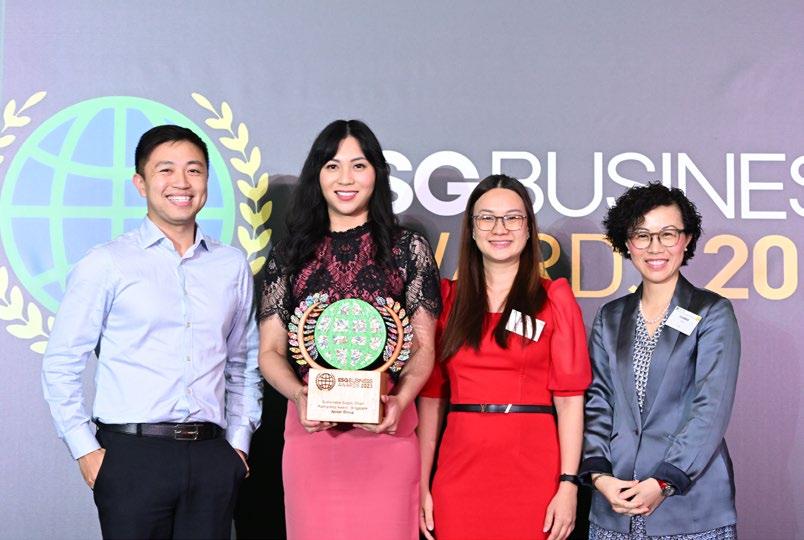



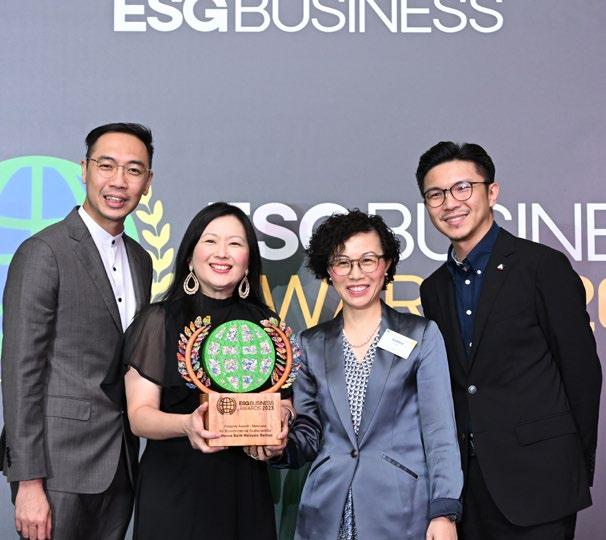


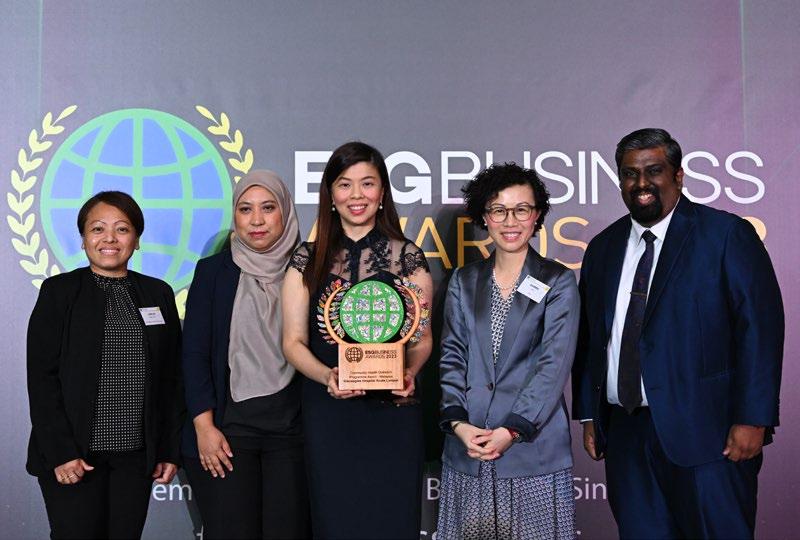




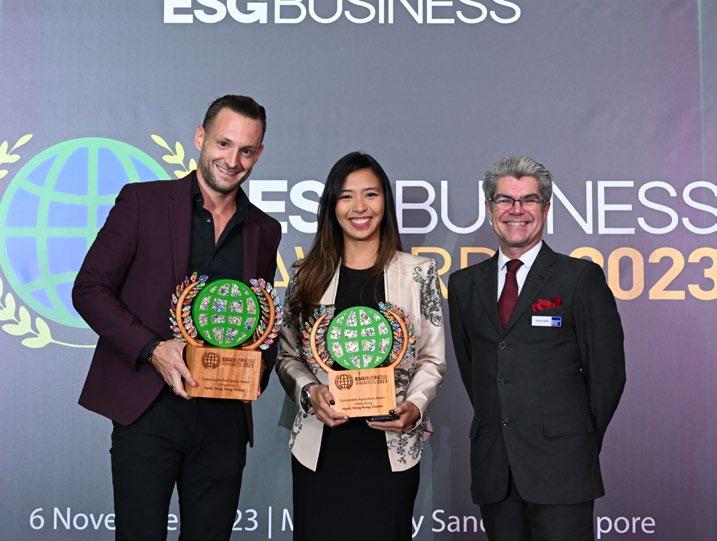

22 ESGBUSINESS 2024
Aboitiz InfraCapital Economic Estates Alibaba Cloud
Alliance Bank Malaysia Berhad Apical Group
APP Sinar Mas
Belden Hirschmann Industries (Suzhou) Limited and Belden India Private Limited
Certis Integrated Facilities Management Pte Ltd East West Seed International Limited
Eupe Corporation Berhad
Forbes Marshall Gleneagles Hospital Kuala Lumpur
Income
KBZ Bank
Herbalife HIVE by
Hyatt, Hong Kong Cluster














ESGBUSINESS 2024 23
Metro Pacific Tollways Corporation
NTUC LearningHub
OCBC Bank (Malaysia) Bhd Paramount Life & General Insurance Corporation (PLGIC)
United Overseas Bank The Medical City South Luzon Universal Robina Corporation Vinschool Joint Stock Company
PT OKI Pulp & Paper Mills Rackspace Technology Petromin and Petromin AutoCare RHB Bank Berhad

SUSTAINABLE INFRASTRUCTURE AWARD - PHILIPPINES GOOD GOVERNANCE AWARD - PHILIPPINES
MPTC pioneers ‘green highways’ in the Philippines
The company leads in toll road innovation and sustainability by creating ‘green highways’, utilising renewable energy, enhancing user experiences through MPT Mobility, and committing towards a sustainable future.
MPTC has established itself as a premier toll road operator in ASEAN, managing concessions like NLEX, SCTEX, NLEX Connector, CAVITEX, CALAX, and CCLEX. Enhancing customer experiences, MPTC introduced MPT Mobility to offer complementary products and services for expressway users. Amidst its transformation, MPTC prioritises environmental sustainability, aiming to minimise environmental and social impacts in its design, construction, and operations.
MPTC initiated its sustainability journey by transforming expressways into ‘green highways’ and optimising energy use through renewable sources and energyefficient technologies. On the North Luzon Expressway (NLEX), Cavite-Laguna Expressway (CALAX), and Cebu-Cordova Link Expressway (CCLEX), the company led the adoption of energy-saving technologies
without compromising safety. With 3,893 solar panels installed at toll plazas and the MPT South headquarters, MPTC powers daytime operations and tollway LED lighting, boosting energy efficiency. MPTC’s goal is to expand renewable energy utilisation across its other offices and locations in the future.
Meanwhile, to reduce water consumption, rainwater catchment systems are installed in rest bays along the Subic-Clark-Tarlac Expressway (SCTEX) and in MPT South Hub.
Enhancing Environmental Sustainability
As of 2023, MPTC’s units NLEX Corp., MPT South, and CCLEC have planted over 38,000 trees under greening and reforestation efforts aligned with national reforestation goals, benefiting partner communities. MPT South’s Headquarters in Imus City, Cavite, achieved LEED Gold Certification in
2021, underscoring MPTC’s commitment to environmental stewardship and sustainable development. Additionally, the company is transitioning its fleet to electric vehicles (EVs) and has installed EV charging facilities.
“At MPTC, we have crafted a comprehensive approach to sustainability in every facet of the broader scope of our operations. Our team ensures that this approach mirrors MPTC’s mission to construct a sustainable and resilient future that aligns with the United Nations’ Sustainable Development Goals of advancing industries and infrastructure; and building sustainable cities and communities. This solidifies our commitment to a more sustainable and eco-conscious future,” said MPTC Chief Corporate Governance, Risk Officer, and concurrent Head of Sustainability Atty. Cynthia G. Casiño.
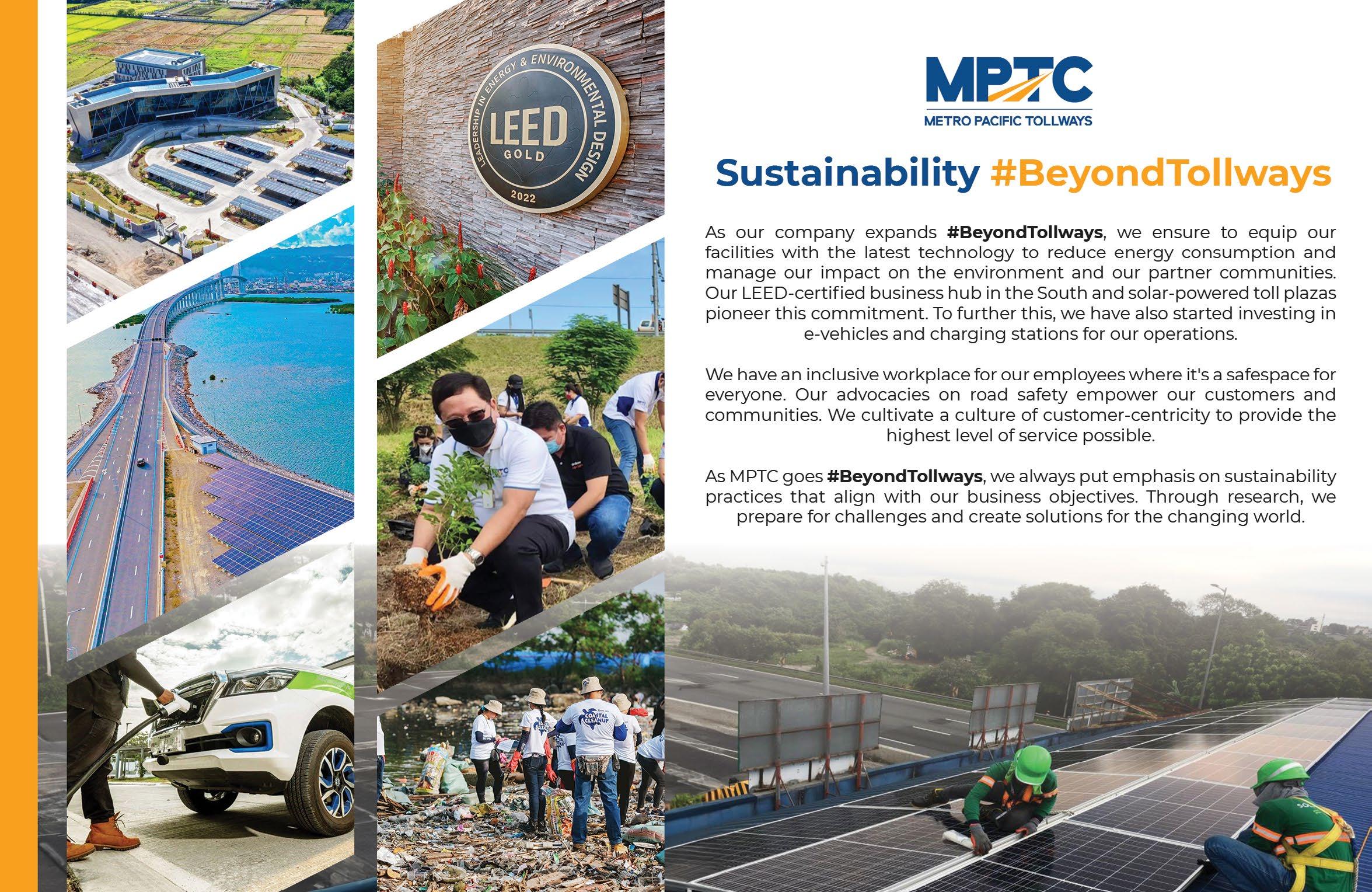


ESGBUSINESS 2024 25












ESGBUSINESS 2024 27 Freeze/ Unfreeze Whenever you notice suspicious transactions One-Time Card Number Only valid for 30 minutes Customise Your Card Set your preferred colour Subscription Card Set preferred spending limit and expiry date Alliance Bank Malaysia Berhad 198201008390 (88103-W) Term and Conditions apply. Alliance Bank Visa Virtual Credit Card Randomly generated 16-digit card number to protect your identity Scan Here to Find Out More






Mechanical, Electrical Maintenances Smart & Sustainable Building Solutions Landscape & Horticulture Services Workplace Management Professional Cleaning & Sanitisation Learn more at www.certisgroup.com/ifm PROVEN ENERGY-SAVING SOLUTIONS FOR YOUR FACILITY Smart, cost-saving, integrated facilities management for commercial buildings, industrial precincts, government facilities, residential areas & more

THE RENEWABLE ENERGY ADOPTION AWARD AT ESGBUSINESS AWARDS
EWS is the market leader for tropical vegetable seeds, headquartered in Thailand, with more than 40 years of experience serving over 23 million smallholder vegetable farmers with quality seeds and innovative services.
East-West Seed was recognised for the deployment of 2.1 megawatts of solar power across its seed processing facilities. A successful energy transition rests not only in the hands of the power sector but in the participation of all industries. Recognising its responsibility as a corporate agriculture company, East-West Seed has been rolling out solar energy units in its facilities globally, winning the Renewable Energy Adoption Award at the inaugural ESGBusiness Award 2023.
Since 2019, the company has deployed solar energy units in its strategic seed processing facilities in India, Philippines, Thailand, Vietnam, Indonesia, and Tanzania. Its farm irrigation in Guatemala is also using 100% solar energy. This brings the company’s total installed capacity to about 2.1 megawatts, with the rooftop solar energy units generating around 2.2 mill kilowatt-hours in 2022.
EWS’ initiative also drives the company’s energy self-sufficiency as the deployment reduced its overall annual grid power dependency by 53% across the seven processing units, whilst the Vietnam seed processing plant is solely reliant on the solar power generated, with the excess energy supplied to the government grid.
“This strategic global approach demonstrates the company’s commitment to sustainability on an international scale and our commitment to clean energy and sustainability has further solidified its position as a responsible environmental steward,” said Sandeep Jadli, Group Head Processing.
EWS’ solar installations at its seed processing plants did not only benefit the company but the wider industry as the effort reduced its reliance on conventional energy resources, thus enabling the company to be more resilient amidst energy price fluctuations and supply disruptions.
This move has also significantly reduced the company’s operational costs, saving around
$170,000 annually, allowing the company to spend the savings to invest in sustainable agriculture for the sustained production of high-quality and

Currently, EWS is working towards establishing its strategic roadmap for sustainable operations and plans to extend its “green energy” efforts throughout its supply chain through knowledge sharing and collaboration with its partners.
The ESGBusiness Awards recognises the efforts of businesses that showcase outstanding commitment and achievement in environmental, social, and governance practices. It recognises initiatives towards the achievement of sustainable development goals, innovation, and driving contribution in various areas such as climate change mitigation, resource conservation, social responsibility, and ethical governance.


Shaping a shared future
•
Placing your well-being at the heart of everything we do
Gleneagles Hospital Kuala Lumpur has been delivering exceptional patient care since 1996. As a part of IHH Healthcare, we are one of the leading private hospitals in the metropolitan capital of Malaysia. Gleneagles Hospital Kuala Lumpur is highly respected for its excellent clinical outcomes and has become a reputable healthcare service provider in both Malaysia and the South East Asian region. Every year, we are caring and treating more than 50,000 international patients from over 120 countries in 40 clinical specialties.
Gleneagles Hospital Kuala Lumpur is one of the first private hospital in Malaysia to be accredited by US-based Joint Commission International (JCI); while locally we are accredited with the Malaysian Society for Quality in Health (MSQH).
In addition, other notable awards that attest to the quality of care at GKL included:
Awards & Accreditation
•
• Hospital of the Year in Malaysia, Customer Care Service Provider of the Year in Asia-Pacific, Endocrinology Service Provider of the Year in Asia-Pacific, Gastroenterology Service Provider of the Year in Asia-Pacific, ICU Service Provider of the Year in Asia-Pacific, Neurology Service Provider of the Year in Asia-Pacific, and Prostate Care Service Provider of the Year in Asia-Pacific at Global Health Awards 2023
2023 Malaysia Hospital Customer Value Leadership Award by Frost & Sullivan
Reader's Digest Trusted Brand Award – 2023
Malaysia Technology Excellence Award 2023 in Medical Technology - Healthcare Award
Healthcare Asia Awards 2023 in Service Innovation of the Year - Malaysia
ESG Business Awards 2023 in Community Health Outreach Programme Award - Malaysia
Malaysia Health & Wellness Brand Awards 2023 - CSR Award
Awards:
















ESGBUSINESS 2024 31
Customers Vendors Operations
Energising Businesses and Communities Worldwide www.forbesmarshall.com Communities
• •
• •
2019 Private Hospitals Category Appointed as the preferred hospital since April 2019
Accreditation:
Live Your Best Life with Herbalife
Herbalife is proud to receive the Workplace Wellness Programme Award at the 2023 ESGBusiness Awards.
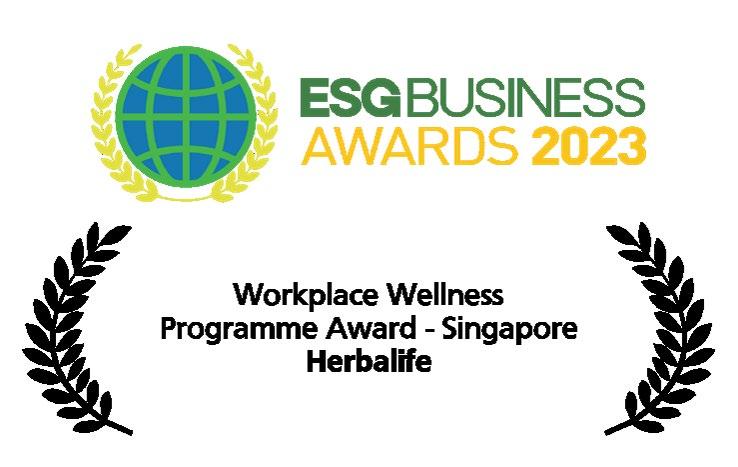











GOOD RATES Enrich Your Journey with at Krungthai Bank
Bank.
Conditions and Exchange Rates are specified by the
































































 Rahul Sharma,
&
Vice President & Global Head of Digital Transformation and Sustainability Practice
Rahul Sharma,
&
Vice President & Global Head of Digital Transformation and Sustainability Practice




























































































